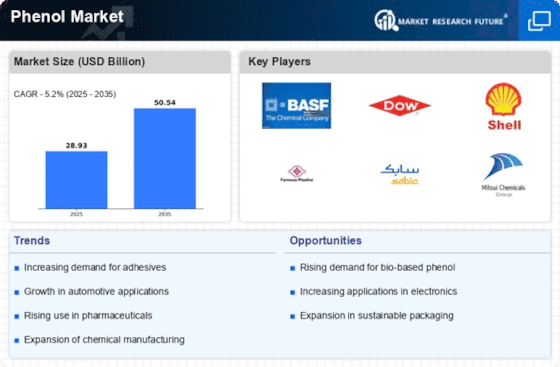Top Industry Leaders in the Phenol Market

The global phenol market is a bustling hub of diverse players and dynamic strategies. From traditional giants to agile startups, each contender aims to leave their mark on this chemically complex canvas. Let's delve into the competitive landscape, exploring key strategies, market share influencers, industry news, and recent developments shaping the future of phenol.
Strategies Orchestrating Market Share:
1. Product Innovation: Players like Shell, Solvay, and Mitsubishi Chemical Corporation are constantly innovating, developing sustainable phenol sources, advanced derivatives, and specialty grades for specific applications. This caters to evolving customer needs and unlocks new market segments.
2. Vertical Integration: Companies like Mitsui Chemicals Inc. and Cepsa are integrating upstream and downstream, controlling feedstock sourcing, phenol production, and distribution channels. This strengthens control over quality, cost, and customer relationships.
3. Strategic Partnerships and Acquisitions: Smaller players are forging partnerships or acquiring businesses with specialized expertise and regional reach. Recent examples include Croda's acquisition of Arkema's biolubricants and additives division and Afton Chemical's partnership with Argentinian biofuel producer Renova.
4. Sustainability Focus: The rise of eco-conscious consumers and stringent environmental regulations are driving the use of bio-based feedstocks for phenol production, development of bio-degradable derivatives, and implementation of energy-efficient processes. Companies like BASF are leading the charge in this area.
5. Regulatory Influence and Lobbying: Key players actively advocate for favorable policies and regulations that support the use of sustainable phenol and derivatives. This includes lobbying for tax breaks, blending mandates for phenol-based resins, and research funding for bio-based phenol production.
Factors Influencing Market Share:
1. Product Quality and Performance: Phenol with superior purity, stability, and reactivity commands higher prices and attracts premium customers. Consistent quality control is crucial.
2. Cost-Effectiveness: Competitive pricing is essential for wider adoption, particularly in cost-sensitive sectors like construction and adhesives. Companies with efficient production processes and optimized supply chains hold an advantage.
3. Regional Growth Dynamics: Asia-Pacific dominates the market due to extensive use of bisphenol A (BPA) in polycarbonate production, driven by the region's booming electronics and automotive industries. Companies with a strong presence here will be well-positioned.
4. Environmental Regulations and Sustainability Credentials: Compliance with stringent environmental regulations and a commitment to sustainable practices through bio-based phenol and energy-efficient processes influence brand reputation and market access.
5. Industry Trends and Technological Advancements: New applications in sustainable composites, high-performance resins, and advanced pharmaceuticals present lucrative opportunities for innovative phenol derivatives. Players at the forefront of technological advancements will thrive.
Key Players:
-
Royal Dutch Shell
-
Solvay SA
-
Deepak Nitrite Limited
-
INEOS Group Limited
-
ALTIVIA Chemicals
-
Sasol Chemicals
-
Mitsubishi Corporation
-
Domo Chemicals
Recent Developments:
June 2023: INEOS and BASF announced a partnership to develop and commercialize new phenol-based technologies. The partnership will focus on developing new processes for the production of phenol and its derivatives, as well as new applications for phenol-based materials.
January 2023: LyondellBasell announced the acquisition of Albemarle's brominated products business, including its phenol derivatives business. This acquisition will make LyondellBasell the world's leading producer of brominated flame retardants.
December 2022: Mitsubishi Chemical Corporation (MCC) and Mitsui Chemicals, Inc. (MCI) announced the formation of a joint venture company to produce and sell phenol and acetone. The new company, called MX Phenol Acetone Corporation, will have a production capacity of 1 million tons of phenol and 600,000 tons of acetone per year.










